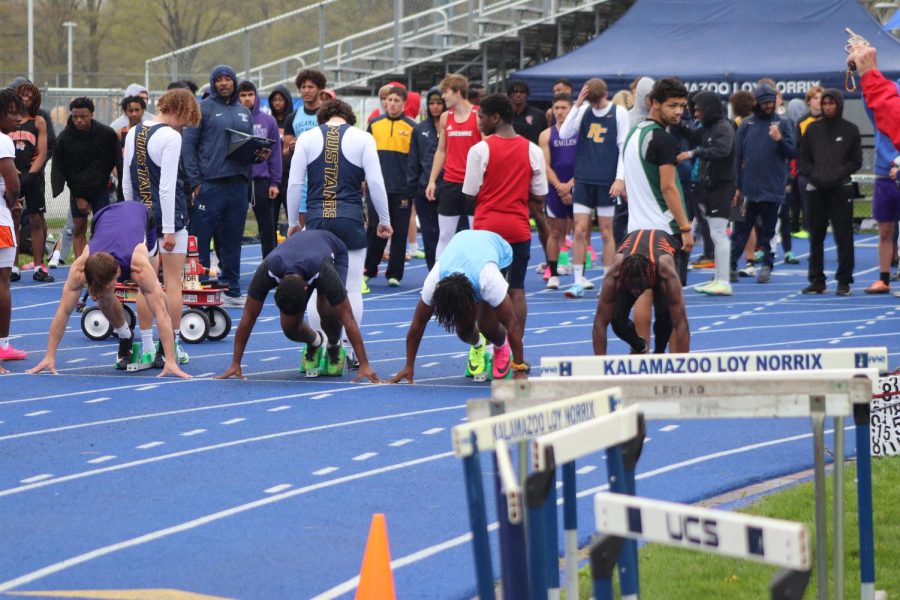High school track and field athletes prepare to face the challenges of competing in college
Credit: Gracie Goschke
Sprinters prepare to begin their event on the starting line of the Loy Norrix track.
May 30, 2023
The smell of popcorn fills your nose as you hear the pop of the starter pistol. Runners sprint by fast enough that you’d miss them if you blinked. Across the field, you see a glimpse of a pole vaulter gliding over the crossbar.
That’s a scene you might see at a track and field meet here at Loy Norrix. The Loy Norrix men’s and women’s track and field team started strong and are doing well. The team is coached by Ted Duckett, Halbert Bates, Bradley Schmidt, Angela Mitchell, James Ford and April Rocco.
This year, the track team has a whopping 115 athletes: 58 boys and 57 girls. Only a handful of these athletes show up and compete in every meet.
“The team is doing better than expected, especially the boys’ team,” said freshman Jackson Lam. “We had a good 4×4 [4×400 meter relay team] at the Gull Lake invite [invitational meet], and a lot of our long-distance guys have been stepping up a lot more than expected.”
Although track and field is considered a solo sport and heavily focuses on personal development, having a well-spirited team is still critical. According to The Stanford Daily, having a team that is enthusiastic and trusting in one another helps each athlete feel more motivated and confident in their sport. Just one motivated athlete can help others feel more motivated to reach their goals. Another important attribute of a team is ambition. Ambition drives many athletes to work hard and improve to achieve their goals.
“Everything is about attitude. You have the wrong attitude, you don’t get what you want. You have a good attitude and don’t mind the work, you understand your goals, you have objectives, then you reach some of those goals and objectives and it’s easier to go forward and reach for more,” said head coach Ted Duckett. “If you’re not succeeding, it gets in your way and the next thing you know, you’re going to fall off. If you plan on playing in college, but you’re not succeeding now, what’s the point of playing?”
Many high school athletes work hard to have the honor of playing their sport in college. College experiences for athletes are different from high school sport experiences. College athletes have to spend more time practicing than high school athletes do.
According to Track Star USA, “As a college athlete, you will be training an average of 12-18 hours a week depending on your event.” On the flip side, high school track and field athletes only need to spend an average of 8-9 hours practicing each week.
High school athletics are meant to teach athletes what it takes to be the best they can be and achieve their goals, even as they transition to the college environment.
Ana Dunfee is a Loy Norrix senior who has committed to Michigan State University’s Division 1 track program.
“Right now I’m just finishing up my track season for high school and trying to get some PR’s [personal records] and stuff. This summer I’m going to be training to be the best I can be going into the fall,” Dunfee said. “There’s a lot of fast people and they’re all a lot older than me, so it’s a little intimidating to go in without being the fastest one there, but it’ll be fun.”
In high school, track and field is full of students that may be brand new to the sport and coaches that are there to help you improve, but not necessarily make you perfect. On the flip side, college track and field teams are full of experienced athletes and coaches that are harder on you. The transition may seem intimidating to some, but practice and preparation are key to having a successful time on a new team.
“Practice, practice, practice. You only get what you’ve earned. There is no free ride. If you’re not willing to outwork other people and keep your nose to the grindstone, you can’t expect success.” Duckett said.
Ted Duckett believes track and field is a valuable sport because along with keeping you in shape, it shows the improvement you can make with your mind and body and teaches you discipline and teamwork.
“You never know what you can do until you try,” said Duckett. “I’d rather see you try and say ‘at least I made it out there and made an effort’ than never try at all.”














